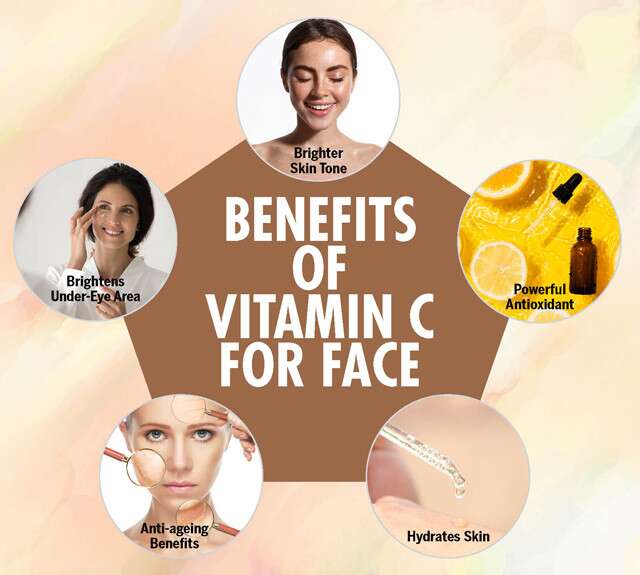Benefits of Vitamin C on Face
Vitamin C is a powerful antioxidant that offers numerous benefits for the skin. In this article, we will explore the various advantages of using vitamin C on the face and how it can contribute to a healthier and more radiant complexion.
Enhances Collagen Production
Vitamin C plays a crucial role in the synthesis of collagen, a protein that provides structure and elasticity to the skin. By promoting collagen production, vitamin C helps to reduce the appearance of fine lines and wrinkles, giving the skin a smoother and more youthful appearance.
Brightens the Skin
Another remarkable benefit of vitamin C on the face is its ability to brighten the skin. It inhibits the production of melanin, the pigment responsible for dark spots and hyperpigmentation. Regular use of vitamin C can help fade dark spots, even out skin tone, and give your complexion a natural radiance.
Protects Against Sun Damage
Vitamin C acts as a natural sunscreen, protecting the skin from harmful UV rays. While it doesn’t substitute for proper sunscreen, it can enhance the effectiveness of sun protection products. Additionally, vitamin C helps to repair sun-damaged skin by reducing inflammation and promoting cell regeneration.
Reduces Inflammation
Inflammation is a common skin concern that can lead to redness, acne, and other skin conditions. Vitamin C possesses anti-inflammatory properties that can help soothe irritated skin and reduce redness. It also aids in healing acne scars and promotes a more even skin tone.
Boosts Skin Hydration
Vitamin C assists in strengthening the skin’s natural moisture barrier, preventing water loss and improving hydration. By retaining moisture, it helps to keep the skin plump and supple, reducing the appearance of dryness and fine lines.

Vitamin C offers a multitude of benefits when applied to the face. From enhancing collagen production to brightening the skin and protecting against sun damage, it is a versatile ingredient that can significantly improve the overall health and appearance of your complexion. Incorporating vitamin C into your skincare routine can help you achieve a more radiant, youthful, and hydrated complexion. Remember to consult with a dermatologist or skincare professional before introducing any new products into your routine.
Frequently Asked Questions
1. What are the benefits of using Vitamin C on the face?
Vitamin C has numerous benefits for the skin, including brightening the complexion, promoting collagen production, reducing hyperpigmentation, and protecting against UV damage.
2. How does Vitamin C brighten the skin?
Vitamin C helps to inhibit the production of melanin, the pigment responsible for dark spots and uneven skin tone. It also promotes skin cell turnover, resulting in a brighter and more radiant complexion.
3. Can Vitamin C help with reducing wrinkles?
Yes, Vitamin C stimulates collagen synthesis, which helps to improve the elasticity of the skin and reduce the appearance of fine lines and wrinkles.
4. Is Vitamin C effective in fading acne scars?
Yes, Vitamin C has the potential to fade acne scars and post-inflammatory hyperpigmentation due to its ability to inhibit melanin production and promote skin healing.
5. Can Vitamin C protect the skin from sun damage?
Yes, Vitamin C is known for its antioxidant properties, which help to neutralize free radicals caused by UV exposure. Applying Vitamin C topically can provide an extra layer of protection against sun damage.
6. How should I incorporate Vitamin C into my skincare routine?
You can incorporate Vitamin C into your skincare routine by using a Vitamin C serum or moisturizer daily. Apply it after cleansing and toning, and before applying sunscreen or moisturizer.
7. Can I use Vitamin C on sensitive skin?
Yes, Vitamin C is generally safe for sensitive skin. However, it’s advisable to do a patch test before applying it to your entire face to ensure there are no adverse reactions.
8. Are there any side effects of using Vitamin C on the face?
In rare cases, some individuals may experience mild irritation or redness when using Vitamin C on the face. If you experience any discomfort, discontinue use and consult a dermatologist.
9. Can I use Vitamin C with other skincare ingredients?
Yes, Vitamin C can be safely combined with other skincare ingredients like hyaluronic acid, retinol, and niacinamide. However, it’s always a good idea to check product labels or consult a dermatologist for compatibility.
10. How long does it take to see results from using Vitamin C on the face?
The results may vary depending on individual skin types and conditions. However, with regular use, you may start noticing improvements in your skin’s texture and appearance within a few weeks.




